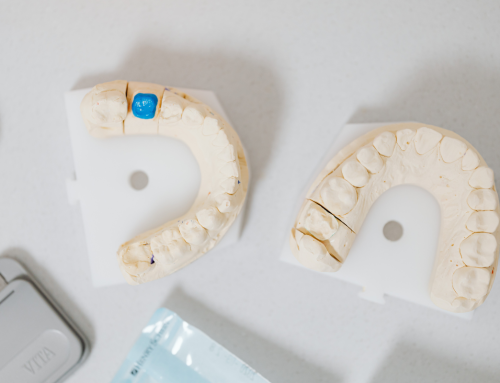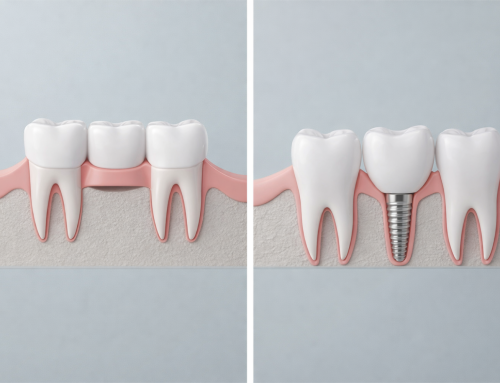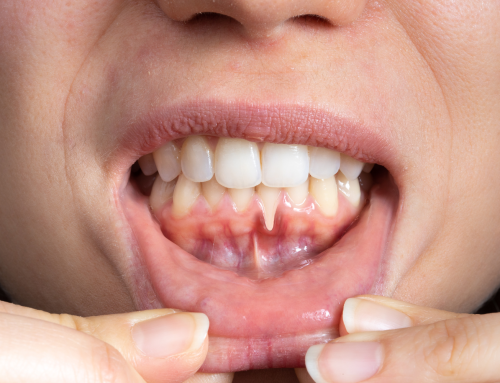As you’re gearing up for the holiday season, chances are, you’ve got a lot on your mind. There are presents that need to be wrapped, turkeys that need to be basted, and family gatherings requiring your attendance.
Amidst the whirlwind, the last thing on your mind is how you might deal with a dental emergency. With all the hard candies, nut brittles, and schedule disruption, our teeth tend to face some serious threats this time of year.
If you happen to get a sudden toothache or a cracked molar, it can bring the holiday cheer to a screeching halt. Worse, it often happens when your dental clinic is on limited holiday hours.
There’s no need to panic. While you can’t always prevent a dental emergency from happening, being prepared and knowing what to do in the moment can make all the difference. Let’s talk about how to prepare for a potential dental emergency during the holidays so you can handle it calmly and get back to making memories with your family.
TL;DR: Your Holiday Dental Emergency Plan
- Toothache: Rinse with warm salt water. Take over-the-counter pain relievers (not aspirin). Don’t put painkillers against the gums.
- Cracked Tooth: Rinse your mouth with warm water. Use a cold compress on your cheek to reduce swelling. Call us for advice.
- Knocked-Out Tooth: A true dental emergency. Handle the tooth by the crown (top part), not the root. Gently rinse it (don’t scrub). Try to place it back in the socket or store it in milk. Call your dentist for emergency care immediately.
- Lost Filling/Crown: Save the crown if you can. You can temporarily use dental cement from a pharmacy to cover the area. Call your dentist to schedule an appointment ASAP.
- Not Sure? If you have severe pain, bleeding that won’t stop, or signs of infection (swelling, fever), you need urgent care. Head to your local hospital or urgent care clinic.
Why Do Dental Emergencies Spike During the Holidays?
It’s not a figment of your imagination, and it’s not just bad luck: the holiday season creates a perfect storm of factors that can put your oral health at risk. Dental emergencies, like all other healthcare emergencies, tend to spike during the holidays due to a number of factors:
→ Hazardous Holiday Foods
That candy cane sure looks festive, but it’s a notorious tooth-cracker. Other culprits include hard peanut brittle, sticky toffee, and even healthy options like nuts or unpitted olives lurking in an appetizer. Even chewing on ice from a festive drink can lead to trouble.
→ Disrupted Routines
With late nights, extensive travel, and all kinds of exciting plans, it’s easy to forget to brush and floss as diligently as you normally would. Unfortunately, plaque doesn’t take a vacation, and a few missed sessions can be enough to irritate your gums or worsen an existing issue.
→ Increased Stress
It’s a massive understatement, but we all know the holidays can be stressful. For many people, stress leads to teeth grinding or clenching (bruxism), especially while they sleep. This added pressure can cause jaw pain, headaches, or even chipped or cracked teeth.
→ Using Teeth as Tools
We’ve all been there: you can’t find the scissors, and your kid is clamouring to start playing with their new toy. So you use your teeth to rip open a stubborn package. It may be convenient at the moment, but it’s a fast track to a chipped tooth and a definite dental emergency.
Simple Steps to Prevent Holiday Dental Emergencies
While you can’t predict every mishap, a few proactive steps can significantly reduce your risk:
Before the Holidays:
- Schedule a checkup at Somerset Dental on James to address any existing issues before they become emergencies
- Stock up on dental supplies: floss, pain relievers, temporary dental cement, and a small dental emergency kit for travel
During Celebrations:
- Be cautious with hard foods like candy canes, nut brittle, and ice
- Cut or break hard foods into smaller pieces rather than biting directly
- Keep your regular brushing and flossing routine, even with a busy schedule
- Find the scissors instead of using your teeth as tools
- If you grind your teeth due to stress, consider wearing your nightguard
A little prevention goes a long way toward keeping your smile intact through the holidays.
Holiday Dental First Aid: Your At-Home Action Plan
When a dental problem strikes on Christmas Eve or New Year’s Day, it’s unlikely that you’ll be seen by your dentist right away. However, there are steps you can take at home to handle the most common holiday dental mishaps before you get to a dentist. Here’s a list of the most common problems, with quick tips on what to do when they happen:
⚠️ A Sudden, Throbbing Toothache
A toothache can appear out of nowhere, but there’s always a direct cause (it just might be something you weren’t previously aware of). Often, it’s thanks to a hidden cavity or food getting lodged deep in your gums. Though common, it can be excruciating, and it’s one of the most common reasons why people seek emergency dental services.
Here’s what to do:
- Rinse Thoroughly: First, gently rinse your mouth with salt water (a teaspoon of salt in a glass of warm water). This can help dislodge any trapped food particles and soothe irritation.
- Floss Carefully: Try to floss around the painful tooth to see if debris is the culprit. Be gentle so you don’t make your gums bleed.
- Manage the Pain: You can take over-the-counter pain medication like ibuprofen or acetaminophen. However, try to avoid placing aspirin directly on the tooth or gums, as it can burn the tissue.
- Use a Cold Compress: If your cheek is swollen, apply a cold compress to the outside in 20-minute intervals. This helps reduce inflammation and numb the area.
Generally, a toothache isn’t considered a dental emergency. However, if the pain is severe, doesn’t go away with pain relievers, or is accompanied by swelling or a fever, it could be a sign of an abscess or a serious infection and is a true dental emergency. Call our office at (587) 713-9284 ASAP to be seen, or head to the emergency room if you aren’t able to get in touch.
⚠️ Cracked or Broken Tooth
You were enjoying some holiday nut mix, and then you felt it: an abrupt crack followed by a sharp jolt of pain. If it happens to you:
- Rinse Immediately: Swish with warm water to clean the area.
- Reduce Swelling: Apply a cold pack to your face over the affected tooth to keep swelling down.
- Save the Pieces: If you can find the broken fragment of your tooth, save it. Bring it with you to your dental appointment.
- Protect Your Mouth: If the broken edge is sharp, you can cover it with a piece of sugar-free gum, wax paraffin, or orthodontic wax to protect your tongue and cheek.
A minor chip usually isn’t urgent, but a large break or crack that’s causing you pain is a dental emergency. Always call to schedule an appointment; the sooner you can be seen, the better our chances of saving the tooth.
⚠️ Lost Crown or Filling
Losing a crown or filling is common any day of the year, but doubly so when sticky holiday treats like caramels or toffee make an appearance. These dental mishaps can expose the sensitive inner part of your tooth and be incredibly uncomfortable.
Here’s what to do:
- Find the Crown: If you can, find the crown and keep it in a safe place. Whatever you do, avoid using household glue or adhesives to reattach it yourself.
- Temporarily Cover the Tooth: You can buy temporary dental cement at most pharmacies. Applying a small amount can protect the exposed tooth from sensitivity. In a pinch, you can also use a small piece of sugarless gum for a very short time.
- Be Gentle: Avoid chewing on that side of your mouth until you can see us.
A lost filling or crown isn’t usually a dire dental emergency (unless you’re in pain). However, you should still call us as soon as possible to schedule an appointment to have it properly replaced, as leaving the tooth exposed makes it vulnerable to further damage or decay.
⚠️ Knocked-Out Tooth
Whether it’s from a fall on an icy sidewalk or a friendly game of ice hockey, a knocked-out permanent tooth is one of the most urgent types of dental emergencies. Time is of the essence here, and while you need to be seen by a dentist as soon as possible, you can follow these tips in the meantime:
- Find the Tooth: If you can, locate the tooth and pick it up by the crown (the chewing surface), not the root.
- Rinse Gently: If the tooth is dirty, rinse it briefly with milk or water. Do not scrub it or use any soap.
- Try to Reinsert It: If you can, gently push the tooth back into its socket. Hold it in place by biting down on a clean cloth or gauze.
- Keep It Moist: If you can’t reinsert it, place the tooth in a small container of milk or your own saliva. Don’t store it in plain water, as the chemicals in tap water, as well as osmotic pressure, can damage root cells (which are necessary for reattachment).
Again, with this kind of dental problem, you need emergency dental care right away. The best chance of saving the tooth is if it’s treated within the first 3–60 minutes.
Handling a Dental Emergency While Travelling
A dental emergency during the holidays is stressful enough at home but is even more daunting when you’re travelling out of town.
If any of the issues described above happen while you’re on the road, start by calling your home dentist first. Even if you’re many miles away, our team at Somerset Dental wants to hear from you. We can offer advice over the phone, assess the situation’s severity, potentially refer you to another dentist in the area, and call in a prescription to a local pharmacy for you, if needed.
If you do need to be seen in person, search online for terms like “emergency dental in Calgary” (if you’re here) or whatever city you happen to be in. You can also check with local dental societies, which often have referral services for emergencies.
Don’t forget to check your dental insurance coverage before you travel. If you have private dental insurance, review whether your plan covers emergency dental treatment outside of Alberta or Canada—this can be helpful information to have should an urgent need arise while you’re away.
Holiday Travel Dental Emergency Kit
Pack these items when traveling during the holidays:
- Temporary dental cement (available at pharmacies)
- Dental wax or orthodontic wax
- Pain relievers (ibuprofen or acetaminophen)
- Salt (for saltwater rinses)
- Small container with lid (for knocked-out tooth storage)
- Your dentist’s contact information
- Copy of your dental insurance card.
Keep this kit in your carry-on or easily accessible luggage.
Is It a Real Dental Emergency? Or Can It Wait?
With holiday hours in full effect, it’s important to know when to seek immediate help versus when it’s safe to wait until clinics reopen.
Seek Immediate Emergency Care For:
- A knocked-out tooth.
- Severe, unbearable pain that isn’t managed by over-the-counter medication (especially important for a child dealing with a dental emergency).
- Bleeding that won’t stop.
- Signs of an abscess or serious infection, like facial swelling, knots on your gums, or a fever.
Can Usually Wait Until Clinics Reopen:
- Dull, manageable toothache
- Lost filling or crown with minimal discomfort
- Minor chip or crack without pain
- Mild sensitivity
When in doubt, it’s always best to call. We can provide guidance and help you decide the best course of action.
Be Prepared for the Holidays With Somerset Dental
The best way to handle a dental emergency is to be prepared. Before the festivities begin, save our number in your phone: (587) 713-9284.
The team at Somerset Dental on James understands that emergencies don’t follow a 9-to-5 schedule. We offer emergency dental services to make sure our patients get the care they need when they need it.
Don’t let a dental mishap ruin your holiday season. If you find yourself in a tough spot, stay calm, follow the recommended steps in this guide, and reach out to our Somerset family dental clinic.
From all of us at Somerset Dental, happy holidays! 🎄





